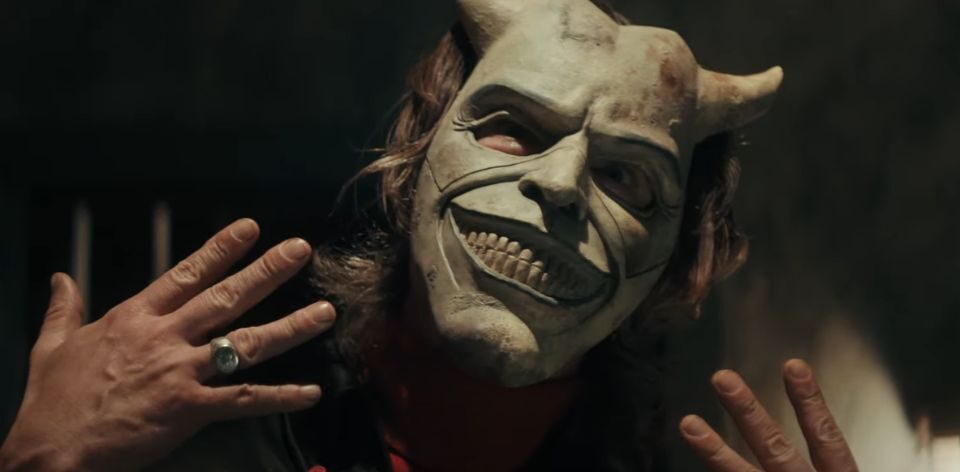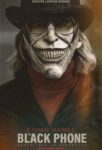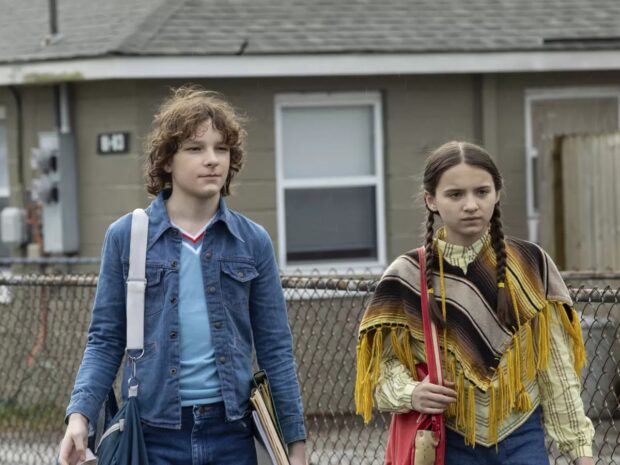While THE BLACK PHONE is not the first of Joe Hill’s works to be adapted to the screen, it may be one of the most unnerving. Which is saying a lot when those adaptations include Locke & Key, NOS4A2, In the Tall Grass and Horns.
Based on a 2004 short story, republished in the 20th Century Ghosts anthology, it arrives in cinemas filtered through the minds of screenwriter C. Robert Cargill (Doctor Strange, TV’s Into the Dark) and skilled horror director Scott Derrickson (The Exorcism of Emily Rose, Sinister). Shifting the setting to the late 1970s, it opens with a serial child abductor nicknamed “The Grabber” (Ethan Hawke) stalking the streets of Denver in a black van.
Young Finney (Mason Thames) and his sister Gwen (Madeleine McGraw) live with their abusive and alcoholic father (Jeremy Davies). Gwen is especially terrorised by him as she claims to see visions in her dreams, something that ultimately drove their mother to suicide in the past. Days after the abduction of a friend, Finney is taken and thrown into a soundproof basement by the Grabber. All seems lost, except for a mysterious black phone on the wall. It isn’t connected, but somehow it connects him to something otherworldly.
THE BLACK PHONE is a genuinely unsettling film — in all the best ways. Derrickson prepares us early, showing some truly uncomfortable scenes of domestic violence, almost going too far in this regard. Yet this forms the foundation of Finney and Gwen’s strength for the trials ahead. Then, even in the claustrophobic confines of the basement, Derrickson finds new ways to terrify us. Most of those scares come from the camera panning away and something bad being there when it pans back, but it got me every time. Every. Damn. Time.
Given the lean set-up, Derrickson relies heavily on the strength of his cast and they are all magnificent. Hawke, mostly disguised by a series of masks, vacillates between eerily friendly and straight-up Pennywising. Finney, who we spend the most time with, convincingly carries the emotional weight of the terror and desperation of the situation. Yet it’s the young McGraw who really stands out, disarming us with well-placed barbs while guiding the audience through the more supernatural elements of the film.
With its desaturated colours and 1970s setting, Derrickson’s film feels lived-in at all times. Filled with soon-to-be-iconic imagery — such as the casual vision of a shirtless Hawke guarding a door with a sinister casualness — Derrickson mostly opts for a ‘less is more’ approach. The precision sound design maximises the limited space as well, wholly immersing the viewer from moment to moment.
After a brief foray into the Marvel Cinematic Universe, Derrickson reconfirms his mastery of the horror film. Sure to please fans of his previous work, and Joe Hill’s constant readers alike, it’s destined to be a cult classic with countless imitators.
2022 | USA | DIRECTOR: Scott Derrickson | WRITERS: Scott Derrickson, C. Robert Cargill (based on a story by Joe Hill) | CAST: Mason Thames, Madeleine McGraw, Jeremy Davies, James Ransone, Ethan Hawke | DISTRIBUTOR: Universal Pictures | RUNNING TIME: 103 minutes | RELEASE DATE: 21 July 2022 (AUS)






